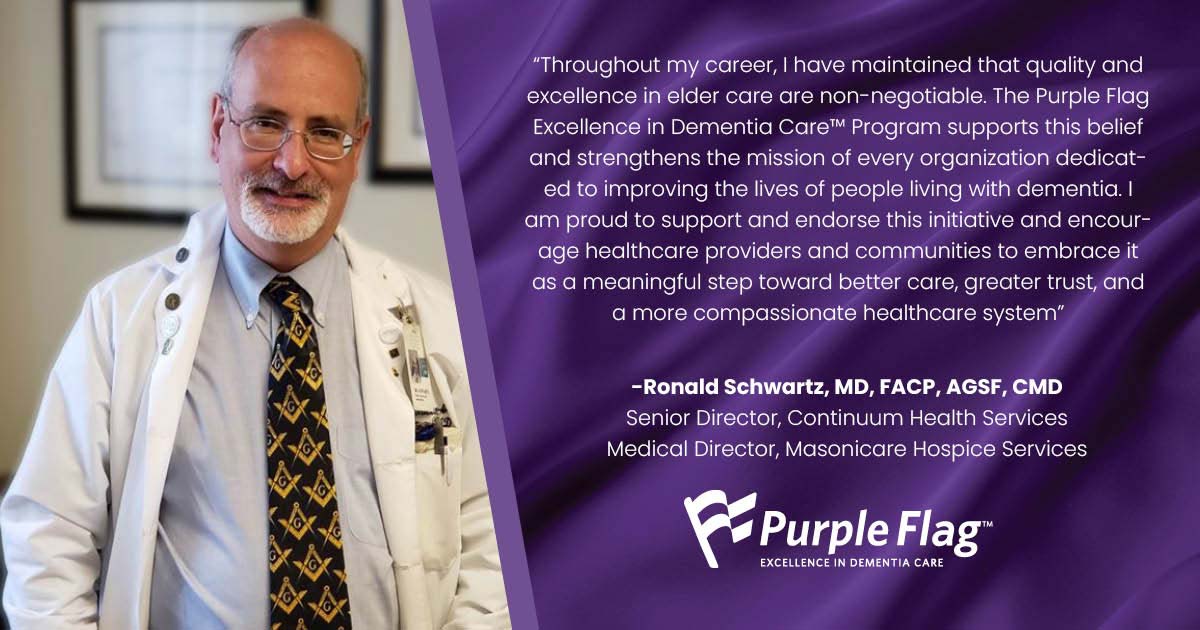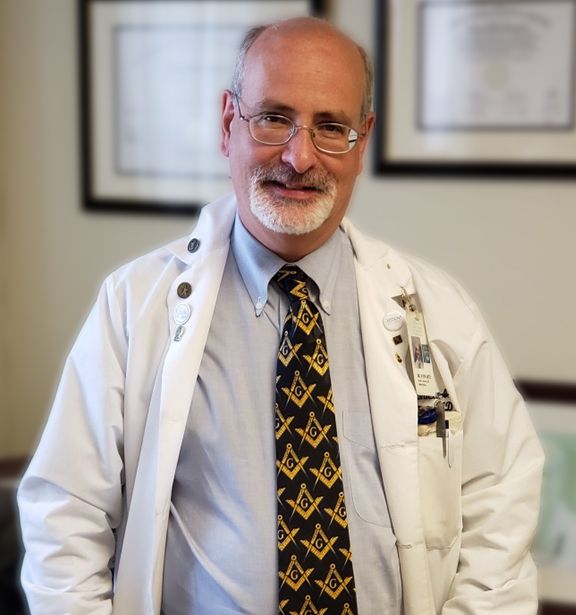
We’re honored to share an endorsement from Dr. Ronald Schwartz, a nationally recognized leader in geriatric medicine. With decades of experience in long-term and dementia care, Dr. Schwartz offers insight into why the Purple Flag Excellence in Dementia Care™ Program is setting a new standard across the care continuum.
 By Ronald Schwartz, MD, FACP, AGSF, CMD
By Ronald Schwartz, MD, FACP, AGSF, CMD
Senior Director, Continuum Health Services
Medical Director, Masonicare Hospice Services
As a Board-Certified Internist and Geriatrician, I have spent more than three decades committed to delivering high-quality, compassionate care to older adults. Throughout my career at Masonicare, I have seen the growing need for elevated standards in dementia care—standards that are embodied by the Purple Flag Excellence in Dementia Care™ Program. This program provides a comprehensive, evidence-informed framework for evaluating and recognizing excellence in the care of individuals living with Alzheimer’s disease and other forms of dementia. It offers families and healthcare providers a clear signal that a community or organization is committed to providing safe, person-centered, and dignified care.
I completed my Geriatric Fellowship at the Philadelphia Geriatric Center/Albert Einstein Medical Center in Philadelphia and am proud to be a Fellow of both the American College of Physicians and the American Geriatrics Society. Additionally, I hold certification as a Medical Director in Long-Term Care from the American Board of Post-Acute and Long-Term Care Medicine. These designations reflect my ongoing dedication to advancing geriatric care through both clinical expertise and leadership.
As Senior Director for Continuum Health Services at Masonicare, I oversee the medical standards across our full spectrum of services, from independent and assisted living to skilled nursing and hospice care. The Purple Flag Program aligns seamlessly with this work, offering a structured approach to quality assurance and performance improvement. By establishing clear criteria for best practices—such as staff training, communication protocols, safety, and engagement—the program serves as both a guide and a benchmark for achieving excellence.
In my role as Medical Director for Masonicare Hospice Services, I care for many patients with advanced dementia. The complexities of late-stage cognitive decline require a nuanced and deeply compassionate approach to care. The Purple Flag designation recognizes organizations that rise to this challenge, providing not only medical excellence but also emotional support and dignity to patients and families. It is an important validation for healthcare teams working tirelessly to deliver meaningful care in the most vulnerable moments of life.
I also contribute to medical education as an Assistant Clinical Professor of Medicine at the Quinnipiac University Frank H. Netter School of Medicine and the University of Connecticut School of Medicine. I view the Purple Flag standards as a model for educating future physicians and health professionals—underscoring the importance of empathy, interdisciplinary collaboration, and evidence-based care when supporting individuals with dementia.
In addition, I serve on the Medical Scientific Advisory Council for the Connecticut Chapter of the Alzheimer’s Association, collaborating with leading researchers from Yale and the University of Connecticut to stay informed about the latest advancements in Alzheimer’s science and care. This work reinforces my commitment to integrating cutting-edge knowledge into daily practice—a principle that is echoed in the continual improvement model of the Purple Flag Program.
Having cared for seniors in hospital, nursing home, ambulatory, assisted living, and home-based settings, I understand the unique challenges faced by care teams across the continuum. For more than 15 years, I also led efforts within Masonicare’s Geriatric Assessment Program, helping families navigate diagnosis and care planning for dementia. The Purple Flag Excellence in Dementia Care™ Program affirms and honors this kind of interdisciplinary, person-centered effort.
What sets the Purple Flag Program apart is its actionable framework for ensuring consistent quality in dementia care. From mandatory staff training and enhanced communication strategies to meaningful resident engagement and environmental safety, it provides a path toward ongoing excellence. It not only celebrates current achievement but also fosters a culture of accountability and continuous learning.
Throughout my career, I have maintained that quality and excellence in elder care are non-negotiable. The Purple Flag Excellence in Dementia Care™ Program supports this belief and strengthens the mission of every organization dedicated to improving the lives of people living with dementia. I am proud to support and endorse this initiative and encourage healthcare providers and communities to embrace it as a meaningful step toward better care, greater trust, and a more compassionate healthcare system.
Home » Blog Archive » Endorsement of the Purple Flag Excellence in Dementia Care™ Program
Endorsement of the Purple Flag Excellence in Dementia Care™ Program
We’re honored to share an endorsement from Dr. Ronald Schwartz, a nationally recognized leader in geriatric medicine. With decades of experience in long-term and dementia care, Dr. Schwartz offers insight into why the Purple Flag Excellence in Dementia Care™ Program is setting a new standard across the care continuum.
Senior Director, Continuum Health Services
Medical Director, Masonicare Hospice Services
As a Board-Certified Internist and Geriatrician, I have spent more than three decades committed to delivering high-quality, compassionate care to older adults. Throughout my career at Masonicare, I have seen the growing need for elevated standards in dementia care—standards that are embodied by the Purple Flag Excellence in Dementia Care™ Program. This program provides a comprehensive, evidence-informed framework for evaluating and recognizing excellence in the care of individuals living with Alzheimer’s disease and other forms of dementia. It offers families and healthcare providers a clear signal that a community or organization is committed to providing safe, person-centered, and dignified care.
I completed my Geriatric Fellowship at the Philadelphia Geriatric Center/Albert Einstein Medical Center in Philadelphia and am proud to be a Fellow of both the American College of Physicians and the American Geriatrics Society. Additionally, I hold certification as a Medical Director in Long-Term Care from the American Board of Post-Acute and Long-Term Care Medicine. These designations reflect my ongoing dedication to advancing geriatric care through both clinical expertise and leadership.
As Senior Director for Continuum Health Services at Masonicare, I oversee the medical standards across our full spectrum of services, from independent and assisted living to skilled nursing and hospice care. The Purple Flag Program aligns seamlessly with this work, offering a structured approach to quality assurance and performance improvement. By establishing clear criteria for best practices—such as staff training, communication protocols, safety, and engagement—the program serves as both a guide and a benchmark for achieving excellence.
In my role as Medical Director for Masonicare Hospice Services, I care for many patients with advanced dementia. The complexities of late-stage cognitive decline require a nuanced and deeply compassionate approach to care. The Purple Flag designation recognizes organizations that rise to this challenge, providing not only medical excellence but also emotional support and dignity to patients and families. It is an important validation for healthcare teams working tirelessly to deliver meaningful care in the most vulnerable moments of life.
I also contribute to medical education as an Assistant Clinical Professor of Medicine at the Quinnipiac University Frank H. Netter School of Medicine and the University of Connecticut School of Medicine. I view the Purple Flag standards as a model for educating future physicians and health professionals—underscoring the importance of empathy, interdisciplinary collaboration, and evidence-based care when supporting individuals with dementia.
In addition, I serve on the Medical Scientific Advisory Council for the Connecticut Chapter of the Alzheimer’s Association, collaborating with leading researchers from Yale and the University of Connecticut to stay informed about the latest advancements in Alzheimer’s science and care. This work reinforces my commitment to integrating cutting-edge knowledge into daily practice—a principle that is echoed in the continual improvement model of the Purple Flag Program.
Having cared for seniors in hospital, nursing home, ambulatory, assisted living, and home-based settings, I understand the unique challenges faced by care teams across the continuum. For more than 15 years, I also led efforts within Masonicare’s Geriatric Assessment Program, helping families navigate diagnosis and care planning for dementia. The Purple Flag Excellence in Dementia Care™ Program affirms and honors this kind of interdisciplinary, person-centered effort.
What sets the Purple Flag Program apart is its actionable framework for ensuring consistent quality in dementia care. From mandatory staff training and enhanced communication strategies to meaningful resident engagement and environmental safety, it provides a path toward ongoing excellence. It not only celebrates current achievement but also fosters a culture of accountability and continuous learning.
Throughout my career, I have maintained that quality and excellence in elder care are non-negotiable. The Purple Flag Excellence in Dementia Care™ Program supports this belief and strengthens the mission of every organization dedicated to improving the lives of people living with dementia. I am proud to support and endorse this initiative and encourage healthcare providers and communities to embrace it as a meaningful step toward better care, greater trust, and a more compassionate healthcare system.